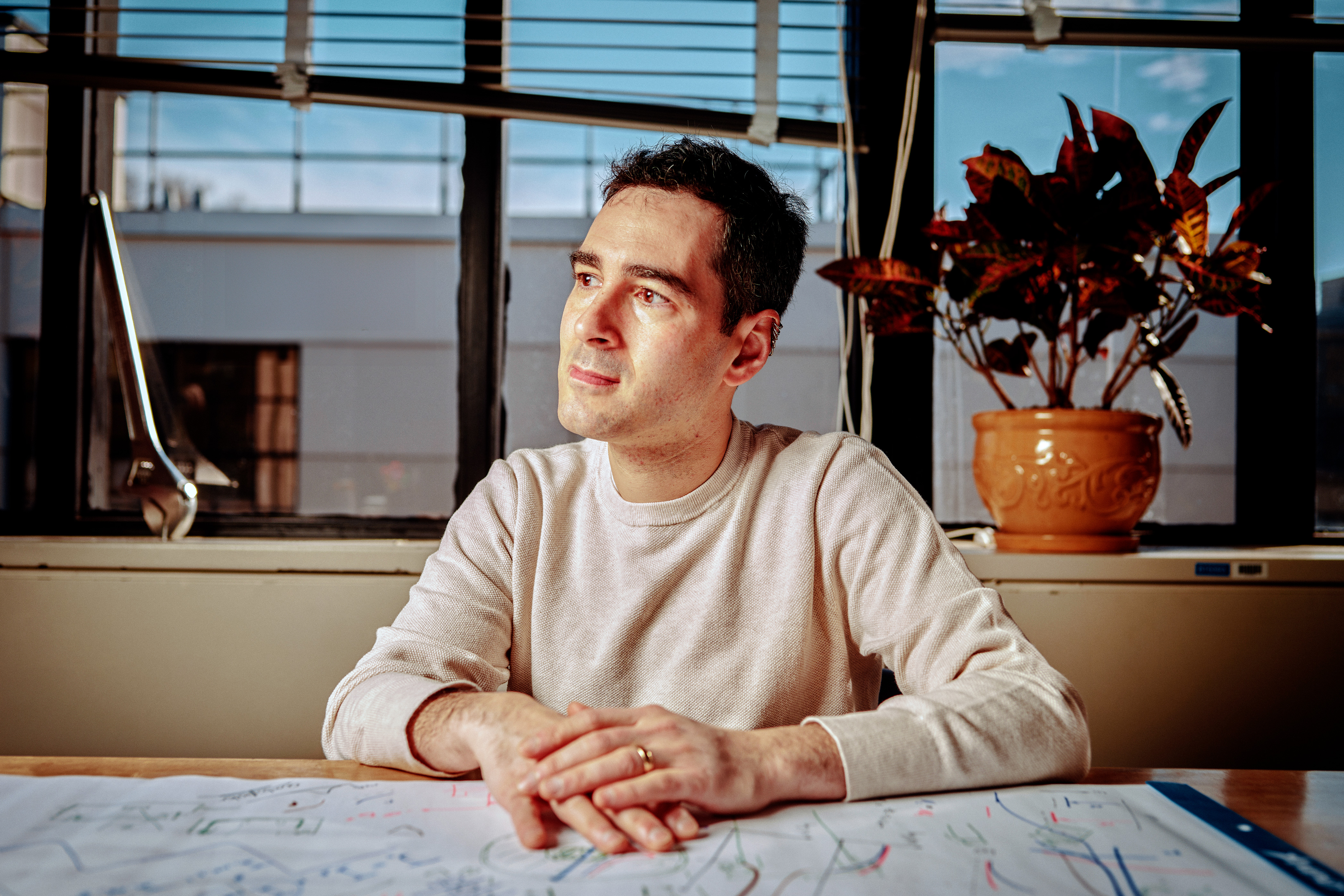
When Rafael Jaramillo talks about his favorite accomplishments, it quickly becomes clear that he has the right temperament for a researcher — he is energized by a challenge and the prospect of hard work.
“I am proudest of things that required risky strategic thinking, followed by years of technical slog, followed by validation,” says Jaramillo, the Thomas Lord Career Development Associate Professor in the Department of Materials Science and Engineering.
Not even the fear of failure deters him. Referring to his work developing new semiconductor materials, he says, “It’s often a fool’s errand to try to replace silicon in any particular application. Time will tell if I spend a career making a fool of myself.”
Of course, Jaramillo is being modest. He has received several significant awards, and in 2021 he and other researchers in his lab succeeded in creating thin, high-quality films using a new family of semiconductor materials, which could be useful in such products as solar cells and environmentally benign LEDs. The materials, called chalcogenide perovskites, are extremely stable and are made of inexpensive, nontoxic elements.
The son of two musicians, Jaramillo grew up attending schools in Brookline, Massachusetts. A second-grade classmate was the son of MIT professor and cosmologist Alan Guth, who volunteered to meet with students in the class and answer their questions about space. Having made a point to check out every library book on space and astronomy, Jaramillo didn’t hold back, and asked Guth about the size of the universe at the earliest stages of the Big Bang.
“He was very kind and patient,” Jaramillo says.
Over the years, Jaramillo’s fascination with space transformed into a love of physics, and he earned his bachelor’s degree in applied and engineering physics at Cornell University and his PhD in physics at the University of Chicago.
Jaramillo says he studied physics “because it satisfied a compulsive need to understand and explain things at a certain level of simplicity.”
“I like physics because I like the methods of physics — the habits of mind, the problem-solving strategies, the experiments,” he says. “Physicists like to tell themselves that they can always figure things out from first principles, and that their field is the opposite of rote memorization.”
A longtime environmentalist with a desire to help society to move beyond reliance on fossil fuels, Jaramillo wanted to focus his knowledge on low-carbon energy after earning his PhD.
“I want to pass on to my kids a world at least as lovely and diverse as I’ve enjoyed and, like most people, I’m worried for the future of our planet,” he says. “Different people can and should bring different disciplinary backgrounds and skillsets to bear on problems of shared importance — it takes a village to solve the hardest ones.”
Jaramillo says that his having switched fields from physics into materials science highlighted some beneficial connections in his work: “I’m sure that some of my ideas, if they contain originality, it’s because I may have a different perspective than others in my field.”
Nonetheless, the switch involved some heavy lifting during two postdocs.
Wanting to engage in solar cell research, “I had to be intentional about seeing postdoc opportunities where I would learn a thing or two about semiconductors, materials science, device optimization, energy technologies, and techno-economies,” Jaramillo says, adding that he read and took notes on hundreds of pages of textbooks “in an attempt to catch up to people around me who always seemed to know more useful things than I did, probably because they did their PhD work in the field.”
Jaramillo conducted postdoctoral research at the Harvard University Center for the Environment and the Harvard School of Engineering and Applied Sciences, as well as at MIT with Tonio Buonassisi, a professor of mechanical engineering and an expert in solar photovoltaics. Jaramillo joined the MIT faculty in 2015 and recently earned tenure.
His current research on new materials could improve the economics and reduce the environmental footprint of semiconductors used in such applications as telecommunications, microelectronics, and photovoltaics.
“We’re butting up against the limitations of the tried-and-true materials,” Jaramillo said in a previous interview with MIT News. “That’s exciting because it means you get to dive in and think about new materials.”
Also exciting to Jaramillo is the increasing worldwide attention devoted to the kind of research he and his lab have been conducting on chalcogenide perovskites for solar cells.
“It used to be a quiet and somewhat lonely field, so I welcome the new community and the competition,” he says. “We took on a lot of risk and delayed gratification for a long time for that project. Now it’s churning out results. If we continue to work quite hard, and if we catch a lot of breaks, it’s possible that chalcogenide perovskite solar cells will contribute meaningfully to the continued expansion of global solar power generation.”
Always the determined researcher, Jaramillo encourages MIT students — who, he is quick to point out, share his high level of motivation — to shoot for the stars.
“I’d say life is short, so aim high,” he says. “As scientists and engineers, that means tackling the hard problems because the easy ones have been solved and, besides, there’s little satisfaction in them.”
#Applications, #Astronomy, #Attention, #BigBang, #Book, #Carbon, #Career, #CareerDevelopment, #Cell, #Cells, #Challenge, #Community, #Course, #Development, #DMSE, #Easy, #Economics, #Energy, #Engineering, #Engineers, #Environment, #Environmental, #Faculty, #Fear, #Focus, #Fossil, #FossilFuels, #Fuels, #Future, #Global, #Ideas, #INterview, #It, #Learn, #Life, #Materials, #MaterialsScience, #MaterialsScienceAndEngineering, #MechanicalEngineering, #Microelectronics, #Mind, #Mit, #MITStudents, #Motivation, #News, #Notes, #Opposite, #Optimization, #Other, #PerovskiteSolarCells, #Perovskites, #Photovoltaics, #Physics, #Power, #Profile, #Project, #Quiet, #Read, #Reliance, #Research, #Risk, #School, #SchoolOfEngineering, #Science, #Semiconductor, #Semiconductors, #Silicon, #Simplicity, #Society, #Solar, #SolarCell, #SolarCells, #SolarPower, #Solve, #Space, #SpaceAndAstronomy, #Stars, #Students, #Sustainability, #Telecommunications, #Time, #Universe, #University, #UniversityOfChicago, #Validation, #Work
Published on The Digital Insider at https://is.gd/D7tD3z.
Comments
Post a Comment
Comments are moderated.